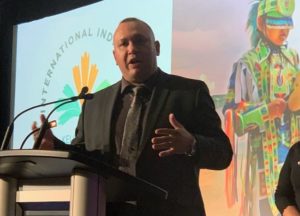Wikwemikong Tourism manager speaks at national Indigenous tourism conference

By Sam Laskaris
CALGARY – There’s no denying the Indigenous tourism industry across Canada has taken quite a beating since the start of the COVID-19 pandemic.
But Luke Wassegijig, the tourism manager for Wikwemikong Tourism, is also looking on the brighter side of things.
Wassegijig was one of five speakers on a panel titled Innovative Experience Development Through COVID-19. This panel was held at the National Indigenous Tourism Conference, which was staged Mar. 8-10 in Calgary.
“Honestly, COVID-19 was a blessing in disguise for us because we were on an upward trajectory,” Wassegijig said. “We had more volume than we could handle. We didn’t have the resources and we didn’t have the capacity I don’t think in 2020. So, it was a blessing in disguise. We stopped and we said, ‘You know what? We need to build a roster of guides. We need to train, we need to retain, we need to rebuild capacity for our organization, specifically for our tour program.’”
With various lockdowns and restrictions in place, officials with Wikwemikong Tourism were able to launch a 16-week cultural guide program for the community.
This program brought together industry-recognized training, knowledge carriers and keepers in the community, academics, and built a plan to deliver a top-notch cultural tourism experience in Ontario.
“We were on an upwards trajectory in 2019 and we came to a sudden stop,” Wassegijig said. “And how do you deal with that mentally? And then you factor in the lockdowns and everything else… From the start we said, ‘Let’s just stop and put on the brakes and let’s build back better. Let’s think about ways to build back better.’ And that’s exactly what we did.”
This was accomplished in several different ways.
“We looked at our tourism strategy and we looked at the core of that strategy which was to build a foundation to sustain tourism in our community,” Wassegijig said. “And we did that. We looked at our pillars, we looked our tourism infrastructure and how we could build on infrastructure. How could we target things like our marinas and increase accessibility for people to our community for when the pandemic ends?”
Wassegijig said local tourism officials also launched a pair of new websites and looked at ways to enhance their marketing and branding. They also launched an app so that people could still visit the community virtually, since various lockdowns prevented them from doing so in-person.
“People still wanted to do that,” Wassegijig said.
Wikwemikong Tourism representatives also explored other ways to diversify revenue streams.
“We looked at trail development services,” he said. “So, what we do is build non-motorized trails for municipalities and First Nations across Ontario. It was a great revenue source for us.”
Joining Wassegijig as panelists were Juanita Marois, Colombe Bourque, Andrew McDonald, and Greg Hopf.
Marois is the executive director of Métis Crossing in Alberta. Bourque is the managing director of Wendake Tourism in Quebec. McDonald is the director of marketing and communications for Wanuskewin Heritage Park in Saskatchewan. And Hopf is the owner/operator of Moccasin Trails in British Columbia.
The panel was moderated by Teresa Ryder, the director of business development for the Indigenous Tourism Association of Canada.

